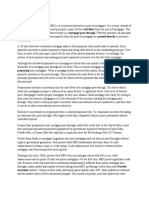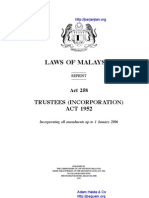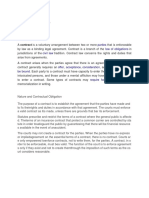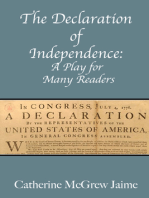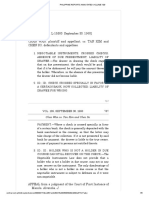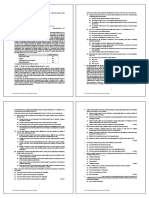Lien Case Law
Lien Case Law
Uploaded by
advramesanCopyright:
Available Formats
Lien Case Law
Lien Case Law
Uploaded by
advramesanOriginal Description:
Original Title
Copyright
Available Formats
Share this document
Did you find this document useful?
Is this content inappropriate?
Copyright:
Available Formats
Lien Case Law
Lien Case Law
Uploaded by
advramesanCopyright:
Available Formats
Nakulan vs The Deputy General Manager
Kerala High Court
Nakulan vs The Deputy General Manager
IN THE HIGH COURT OF KERALA AT ERNAKULAM
PRESENT:
THE HONOURABLE MR.JUSTICE V.CHITAMBARESH
WEDNESDAY, THE 18TH DAY OF DECEMBER 2013/27TH AGRAHAYANA, 1935
WP(C).No. 30600 of 2013 (Y)
----------------------------
PETITIONER(S):
----------------
NAKULAN, AGED 41 YEARS
S/O.MANOHARAN, KOTTAKUZHIYIL VEEDU
MANAPPALLY NORTH PO, THAZHAVA, KARUNAGAPALLY
KOLLAM DISTRICT, PIN 690 574.
BY ADV. SRI.M.R.SASITH
RESPONDENT(S):
-----------------
1. THE DEPUTY GENERAL MANAGER, CANARA BANK
CIRCLE OFFICE, KOLLAM - 691 001.
2. THE AUTHORISED OFFICER
CANARA BANK, THAZHAVA BRANCH, KOLLAM 690 574.
3. THE BRANCH MANAGER
CANARA BANK, THAZHAVA BRANCH, KOLLAM 690 574.
R BY SRI.V.B.HARI NARAYANAN, SC CANARA BANK.
THIS WRIT PETITION (CIVIL) HAVING COME UP FOR ADMISSION ON
18-12-2013, THE COURT ON THE SAME DAY DELIVERED THE FOLLOWING:
WP(C).No. 30600 of 2013 (Y)
----------------------------
APPENDIX
PETITIONER(S)' EXHIBITS
Indian Kanoon - http://indiankanoon.org/doc/54249096/ 1
Nakulan vs The Deputy General Manager
---------------------------
EXHIBIT P1 COPY OF THE LOAN PASS BOOK ISSUED BY THE 3RD RESPONDENT
EXHIBIT P2 COPY OF THE NOTICE DATED 8/7/2013 SEND BY THE 3RD
RESPONDENT
EXHIBIT P3 COPY OF THE REPRESENTATION PREFERRED BEFORE THE BANKING
OMBUDSMAN DATED NIL
EXHIBIT P4 COPY OF THE PETITION BEARING NO. PLP/ST 54/13 BEFORE THE
THALUK LEGAL SERVICES COMMITTEE, KARUNAGAPALLY
EXHIBIT P5 COPY OF THE LAWYER NOTICE ISSUED BY THE PETITIONER LAWYER
EXHIBIT P6 COPY OF THE JUDGMENT DATED 11/3/2013 WPC NO. 5670/2013
EXHIBIT P7 COPY OF THE JUDGMENT DATED 23/5/2013 IN WA NO.656/2013
RESPONDENT(S)' EXHIBITS : NIL.
------------------------------
//TRUE COPY//
P.S. TO JUDGE.
'C.R.'
V.CHITAMBARESH, J.
-------------------------------
WP (C) No. 30600 of 2013
-------------------------------
Dated this the 18th day of December, 2013
J U D G M E N T
Can the Bank retain the gold ornaments offered as security while availing a loan even after the same
is cleared on the premise that the borrower has not discharged his liability in respect of another loan
?
2. The petitioner availed a personal loan of `.25,000/- from the Canara Bank ('the Bank' for short)
on 31.1.2012 agreeing to repay the same with interest in equated monthly instalments in a span of
three years. The personal loan was availed on the basis of a demand promissory note executed by
Indian Kanoon - http://indiankanoon.org/doc/54249096/ 2
Nakulan vs The Deputy General Manager
the petitioner in favour of the Bank and no security of any sort was obtained at the time of the
transaction. The petitioner also availed a gold loan of `.85,000/- from the Bank on 11.5.2012 on
pledging 46.700 grams of gold and agreeing to clear the same with interest on or before 10.5.2013.
The petitioner asserts that he is willing to clear the gold loan in its entirety and that the Bank is
bound to release the gold ornaments pledged without retaining it as security for the personal loan.
The Writ Petition W.P.(C) No.30600/2013 has been filed seeking the issue of a writ of mandamus
directing the Bank to release the gold ornaments pledged on the petitioner clearing only the gold
loan.
3. The Bank contends that the amounts due in the personal loan and the gold loan are `.31,147/- and
`.95,086/- respectively and that the gold ornaments cannot be released without the petitioner
discharging the entire liability. The Bank relies on Section 171 of the Indian Contract Act, 1872 ['the
Act' for short] to exercise its right of lien and retain as security the gold ornaments pledged for
amounts due from the petitioner. The Bank also urges that a writ should not be issued which tends
to interfere with its banking operations especially when the motions made by the petitioner to the
Banking Ombudsman and Taluk Legal Services Committee are pending.
4. I heard Mr.Sasith Panicker, Advocate on behalf of the petitioner and Mr.Hari Narayan.V.B.,
Advocate on behalf of the Bank.
5. Section 171 of the Act is as follows:-
171. General lien of bankers, factors,
wharfingers, attorneys and policy brokers - Bankers,
factors, wharfingers, attorneys of a High Court and policy- W.P.(C) No.30600/2013 brokers may, in
the absence of a contract to the contrary, retain as a security for a general balance of account, any
goods bailed to them; but no other persons have a right to retain, as a security for such balance,
goods bailed to them, unless there is an express contract to that effect. (emphasis supplied) The
following excerpt from Syndicate Bank v. Vijay Kumar and others [(1992) 2 SCC 330] which is the
oft quoted decision of the Supreme Court on this point is apposite and sets at rest the controversy:
In Halsbury's Law of England, 2nd Edn., Vol.20, p.552, para 695, lien is defined as
follows:-
"Lien in its primary sense is a right in one man to retain that which is in his
possession belonging to another until certain demands of the person in possession
are satisfied. In this primary sense it is given by law and not by contract."
In Chalmers on Bills of Exchange, 13th Edn., p.91 the meaning of "Banker's lien" is
given as follows:
Indian Kanoon - http://indiankanoon.org/doc/54249096/ 3
Nakulan vs The Deputy General Manager
"A banker's lien on negotiable securities has been judicially defined as 'an implied
pledge'. A banker has, in the absence of agreement to the contract, a lien on all bills
received from a customer in the ordinary course of banking business in respect of any
balance that may be due from such customer."
In Chitty on Contract, 26th Edn., p.389, para 3032 the Banker's lien is explained as
under:
"Extent of lien - By mercantile custom the banker W.P.(C) No.30600/2013 has a
general lien over all forms of commercial paper deposited by or on behalf of a
customer in the ordinary course of banking business. The custom does not extent to
valuables lodged for the purpose of safe custody and may in any event be displaced by
either an express contract or circumstances which show an implied agreement
inconsistent with the lien....
...... The lien is applicable to negotiable instruments which are ..... remitted to the
banker from the customer for the purpose of collection. When collection has been
made the proceeds may be used by the banker in reduction of the customer's debit
balance unless otherwise earmarked." In Paget's Law of Banking, 8th Edn., p.498 a
passage reads as under:
"The Banker's Lien Apart from any specific security, the banker can look to his
general lien as a protection against loss on loan or overdraft or other credit facility.
The general lien of bankers is part of law merchant and judicially recognised as such."
In Brandao v. Barnett, it was stated as under: (All ER p.722-H) "Bankers, most
undoubtedly, have a general lien on all securities deposited with them, as bankers, by
a customer, unless there be an express contract, or circumstances that show an
implied contract, inconsistent with lien."
The above passages go to show that by mercantile system the Bank has a general lien over all forms
of securities or W.P.(C) No.30600/2013 negotiable instruments deposited by or on behalf of the
customer in the ordinary course of banking business and that the general lien is a valuable right of
the banker judicially recognised and in the absence of an agreement to the contrary, a Banker has a
general lien over such securities or bills received from a customer in the ordinary course of banking
business and has a right to use the proceeds in respect of any balance that may be due from the
customer by way of reduction of customer's debit balance. (emphasis supplied)
6. The High Court of Allahabad in State Bank of India, Kanpur v. Deepak Malaviya and others [AIR
1996 Allahabad 165] reiterated the same principle when it observed as follows:-
16. Section 171 of the Act refers to the lien of banker's etc. The right of security for
general balance on account of any goods bailed to them. In other words if certain sum
is due to the Bank in one account it may retain as security money or other movable
Indian Kanoon - http://indiankanoon.org/doc/54249096/ 4
Nakulan vs The Deputy General Manager
that comes into its hands in another account. The aforesaid analysis makes it clear
that the Lower Appellate Court was in error in taking a view that the Bank could not
have claimed lien over the pledged ornaments of the predecessor-in-interest of the
respondent. Section 171 of the Act and the general principles covering the banker's
lien specifically authorise the Bank to retain the pledged ornaments claiming lien
over them till the Bank's money is not cleared by the respondents for the loan in
connection with the other W.P.(C) No.30600/2013 account for which a decree has
already been passed in favour of the Bank. (emphasis supplied) Again the High Court
of Andhra Pradesh in K.Sita v.
Corporation Bank, East Godawari [(1999) 3 ALT 443] upheld the right of the Bank to retain the gold
ornaments pledged in exercise of its general lien till all the debts are cleared. This Court in
Thankappan v. Muthukoya [(2011) 2 KLT 907] has held that the general lien can be exercised by a
banker even with regard to debts which have become barred by limitation. It was observed thus:-
In the light of the authorities mentioned above, the principles are fairly clear. The
bank has general lien over the securities which come to its hands. It may be in the
form of money, negotiable instrument or any form of security or it may be goods.
S.171 of the India Contract Act statutorily recognises the banker's lien. To apply the
banker's lien, it is not necessary that the debt in respect of which and for the recovery
of which the lien is exercised should be one which is not barred by limitation. Bar of
limitation for realisation of a debt does not destroy or extinguish the right of the
creditor for the debt. It only destroys the remedy. The creditor is not precluded from
appropriating or adjusting the amounts of the debtor which come to his hands and
from appropriating it towards a barred debt. (emphasis supplied) W.P.(C)
No.30600/2013
7. Thus a Bank has a general lien over all forms of security including gold ornaments
deposited by or on behalf of the borrower in the ordinary course of banking business
for the general balance of account due from him. The Bank has a further right to sell
the securities like the gold ornaments and utilise the proceeds in discharge of the
liability due by the borrower in respect of other loans even. This is of course subject
to the condition that there is no 'contract to the contrary' between the borrower and
the Bank whereby the right of general lien could be statutorily waived. The general
lien can be exercised when there is a bailment of gold ornaments by way of security
for the repayment of a debt and certainly not in respect of goods entrusted to the
Bank for safe custody in a locker. The general lien shall be presumed even in regard
to advances made subsequent to the loan availed by pledging the gold ornaments as
is evident by Section 174 of the Act.
8. The burden is always on the borrower to establish 'a contract to the contrary' in order to displace
the presumption in favour of the Bank under Section 171 of the Act about the existence of a right of
general lien. It is not for the Bank to W.P.(C) No.30600/2013 establish otherwise as a presumption
of a right of general lien in its favour flows from Section 171 of the Act which can of course be
Indian Kanoon - http://indiankanoon.org/doc/54249096/ 5
Nakulan vs The Deputy General Manager
rebutted by the borrower. That the onus of proof is on the borrower is well settled over a century ago
by the Division Bench of the High Court of Madras in Kunhan Mayan and others v. Bank of Madras
[(1896) ILR 19 Madras 234]. Mr.Justice Shephard in his separate judgment concurring with
Mr.Justice Best after examining the amplitude of Section 171 of the Act observed therein as follows:-
It being incumbent on the plaintiff to show that the bank had agreed to give up the
general lien to which by law a bank is prima facie entitled, I must say that in my
opinion the plaintiff has failed in his proof.
There is however no plea by the petitioner that there was a contract to the contrary in the instant
case disabling the Bank from exercising its right of general lien and thus withhold the gold
ornaments till the personal loan is also wiped off.
9. The Bank sells the goods pledged not as agents of the borrower but as pledgees in exercise of the
power under Section 176 of the Act and the provisions of the Banking Regulation Act, 1949 ('the
1949 Act' for short). The sale of W.P.(C) No.30600/2013 pledged assets takes place in the course of
banking business and thereby the Bank recovers not only its dues but also recovers interest and its
other charges. The question whether lending of money on the security of gold ornaments and its sale
on default committed by the borrower is part of banking business or not is no longer res integra. The
question is answered affirmatively by the Supreme Court in Federal Bank Ltd. v. State of Kerala
[2007 (3) KLT 106 (SC)] wherein it has inter alia been held as follows:-
Further on reading the provisions of the 1949 Act, one finds that every bank is
required to maintain its balance-sheet in Form "A" of the Third Schedule, quoted
above. The prescribed form indicates that non-banking assets acquired by the banks
even in satisfaction of claims, are required to declare their holdings. The prescribed
form of balance-
sheet indicates that banks are required to show on the asset side, non-banking assets acquired by
them in satisfaction of claims. Similarly, in Form 'B' of the Third Schedule under Profit and Loss
Account, banks are required to show income from non-banking assets and profit from sale of such
assets. In our view, therefore, sale of pledged assets takes placed in the course of banking business.
Therefore, as stated above, the banks, in selling the goods pledged to them, did not act as agents of
the borrowers/pledgers and that their sale was in exercise of statutory power under the 1949 Act.
Further, in our view it W.P.(C) No.30600/2013 is no doubt true that under S.8 of the 1949 Act,
banks are prohibited from trading in goods. However, if one reads S.8 along with Third Schedule to
the 1949 Act it is clear that dealing in non-banking assets is a banking business and the exception
made in S.8 which allows banks to realize security and which allows banks to engage in trade in
order to realize security, falls within the banking business whenever undertaken. When a pledged
article is sold in an auction, the bank recovers not only its dues but also recovers interests and its
other charges. This realization falls within the parameters of the Third Schedule to the 1949 Act. In
the circumstances, we are of the view that sale of pledged ornaments falls within the course of
banking business under the 1949 Act.
Indian Kanoon - http://indiankanoon.org/doc/54249096/ 6
Nakulan vs The Deputy General Manager
10. Heavy reliance is placed by the petitioner on the judgment of the Division Bench in Canara Bank
v. Haridas Shenoy and another [W.A.No.656/2013] and my attention was drawn to the following
observations therein:-
4. ....... Learned counsel for the appellant relies upon Section 171 of the Indian
Contract Act to contend that bankers' general lien would come in aid of the appellant
bank, therefore, gold cannot be allowed to be released even if the amount due so far
as the gold loan is deposited. Section 171 of the Indian Contract Act reads as under:
"171. General lien of bankers, factors, wharfingers, attorneys and policy-brokers:-
Bankers, facotrs, wharfingers, attorneys of a High Court and policy-brokers may, in
the absence of a W.P.(C) No.30600/2013 contract to the contrary, retain as a security
for a general balance of account, any goods bailed to them; but no other persons have
a right to retain, as a security for such balance, goods bailed to them, unless there is
an express contract to that effect."
5. Reading of the above section makes very clear that the gold pledged for raising the
loan as gold loan cannot be the subject matter of bankers' general lien. Therefore, the
appellant cannot insist on retaining the gold pledged by the borrower once he repays
the entire dues so far as the gold loan. If the borrower completely discharges the loan
amount pertaining to gold loan, the appellant bank is bound to release the gold in
favour of the borrower.
But the Bank alertly points out that the above observations are in conflict with the statutory
provisions and the dictum laid down by the Supreme Court in Syndicate Bank's case referred to
supra and that the same is not sound law. The Bank also contends that the judgment in
W.A.No.656/2013 is not final in as much as the Supreme Court has entertained the challenge
thereto in Special Leave to Appeal (Civil) No.27995/2013.
11. A reading of the judgment of the learned Single Judge in W.P.(C) No.5670/2013 from which
W.A.No.656/2013 was filed would indicate the circumstances under which the right of general lien
of the Bank was refused. It appears that W.P.(C) No.30600/2013 the Bank had no case therein that
the security furnished for the housing loan and the loan availed by a proprietary concern was
inadequate and hence the general lien is to be exercised. It would be inappropriate for me to discuss
more about the implications of the judgment in W.A.No.656/2013 since the same has not become
final as indicated above. The Bank in the instant case has a specific plea that the personal loan
availed by the petitioner on the basis of a demand promissory note is without any security and that
the gold ornaments have to be retained. Therefore nothing deters me from relying on Section 171 of
the Act and following the dictum in Syndicate Bank's case supra to hold that the Bank is entitled to
retain as security the gold ornaments pledged till the personal loan is also cleared. The prayer of the
petitioner for a direction to the Bank to release the gold ornaments pledged on his clearing the gold
loan keeping the personal loan in tact is hereby declined.
Indian Kanoon - http://indiankanoon.org/doc/54249096/ 7
Nakulan vs The Deputy General Manager
12. The petitioner faced with this situation seeks easy instalments to repay the personal loan due to
the Bank even though he has expressed his willingness to clear the gold loan in lump within a short
time. I permit the petitioner to repay the W.P.(C) No.30600/2013 amount due towards the personal
loan in 6 equal monthly instalments starting from 2.1.2014 in which event the sale of the gold
ornaments pledged shall be deferred. The coercive proceedings by the Bank for realisation of the
amounts due shall surge ahead if the petitioner commits default in the payment of any one of the
instalments as directed above.
The Writ Petition is disposed of. No costs.
V.CHITAMBARESH, Judge.
nj.
Indian Kanoon - http://indiankanoon.org/doc/54249096/ 8
You might also like
- Land Titles & DeedsDocument10 pagesLand Titles & DeedsJewn KroosNo ratings yet
- Chapter 13 Bankruptcy in the Western District of TennesseeFrom EverandChapter 13 Bankruptcy in the Western District of TennesseeNo ratings yet
- Petition for Certiorari – Patent Case 01-438 - Federal Rule of Civil Procedure 52(a)From EverandPetition for Certiorari – Patent Case 01-438 - Federal Rule of Civil Procedure 52(a)No ratings yet
- Securities and Exchange Commission (SEC) - Form1-EDocument3 pagesSecurities and Exchange Commission (SEC) - Form1-EhighfinanceNo ratings yet
- Nevada Distirct Court Filing Codes - CivilDocument21 pagesNevada Distirct Court Filing Codes - CivilJericho RemitioNo ratings yet
- Tender Document of Internal Control Proc 2007Document21 pagesTender Document of Internal Control Proc 2007lightknowNo ratings yet
- BankingDocument168 pagesBankingVaishnav Kumar100% (1)
- Example Late PaymentDocument2 pagesExample Late PaymentZsuzsa TóthNo ratings yet
- CCC C C C CDocument10 pagesCCC C C C COverbreadth EnirtcodNo ratings yet
- In Proposed Mortgage Fraud Settlement, A Gift To Big Banks - EisingerDocument3 pagesIn Proposed Mortgage Fraud Settlement, A Gift To Big Banks - EisingerjosephsomersNo ratings yet
- Account Closure Request Form (MCX)Document1 pageAccount Closure Request Form (MCX)Deepak Thakur100% (1)
- 28902cpt Fa SM Cp7 Part3Document49 pages28902cpt Fa SM Cp7 Part3BasappaSarkarNo ratings yet
- Nego TerminologiesDocument15 pagesNego TerminologiesLee Somar100% (1)
- Commentary On The Security AgreementDocument1 pageCommentary On The Security AgreementJason HenryNo ratings yet
- Meeting of The Minds Between TwoDocument15 pagesMeeting of The Minds Between Twoedna marieNo ratings yet
- What Is LawDocument2 pagesWhat Is LawXagonNo ratings yet
- Banking Finance Policies and Procedures Manual ExtractDocument51 pagesBanking Finance Policies and Procedures Manual ExtractLovemore Tshuma100% (1)
- Online Advanced Criminal Law Course - BrochureDocument20 pagesOnline Advanced Criminal Law Course - BrochurePreethi LawNo ratings yet
- 1 MainDocument29 pages1 MainMotherboardTVNo ratings yet
- SURETY LABOR-Make Yours Rev3aDocument1 pageSURETY LABOR-Make Yours Rev3amrandmscharlesNo ratings yet
- In The Matter of Property Seized For Forfeiture From Address 2109 320th Street, Lake View, Iowa 51450Document7 pagesIn The Matter of Property Seized For Forfeiture From Address 2109 320th Street, Lake View, Iowa 51450thesacnewsNo ratings yet
- Standing at The Gates W DerrickDocument25 pagesStanding at The Gates W DerrickdadadangerNo ratings yet
- Reverse Mortgages, Report To Congress, CFPB June 28, 2012Document231 pagesReverse Mortgages, Report To Congress, CFPB June 28, 2012Neil Gillespie100% (1)
- INSOLVENCY and Arbitration HandoutDocument4 pagesINSOLVENCY and Arbitration HandoutWan NieNo ratings yet
- Bank Mgt.Document9 pagesBank Mgt.MeNna FOuadNo ratings yet
- The Past, Present, and Future of Bankruptcy Law in AmericaDocument18 pagesThe Past, Present, and Future of Bankruptcy Law in AmericaRicharnellia-RichieRichBattiest-CollinsNo ratings yet
- Fannie Mae Active Doc Custodians 2011Document2 pagesFannie Mae Active Doc Custodians 2011Carolyn Wilder100% (1)
- The New Direct Tax Code (DTC)Document18 pagesThe New Direct Tax Code (DTC)aggarwalajay2No ratings yet
- T E C L: HE Volution OF THE Ommon AWDocument54 pagesT E C L: HE Volution OF THE Ommon AWAnne NatawirawanNo ratings yet
- Notice Bonds (2)Document6 pagesNotice Bonds (2)B100% (1)
- Washed - Amended RemovalDocument7 pagesWashed - Amended Removalkool wa100% (2)
- Business Was Established After The Disaster: Pdcrecons@sba - GovDocument2 pagesBusiness Was Established After The Disaster: Pdcrecons@sba - GovVince KimmetNo ratings yet
- What Are SecuritiesDocument12 pagesWhat Are SecuritieszahreenamolinaNo ratings yet
- Servus Credit Union LTD V Parlee, 2015Document33 pagesServus Credit Union LTD V Parlee, 2015ravenmailmeNo ratings yet
- What Is Title Forensics?Document6 pagesWhat Is Title Forensics?daveafxNo ratings yet
- Case Law MethodologyDocument2 pagesCase Law MethodologyCt AyeshaNo ratings yet
- Local Rules v12 - Revised 7-1-16Document99 pagesLocal Rules v12 - Revised 7-1-16David BriggsNo ratings yet
- Marjon A. Limot October 7, 2020 Bsba-3B TTH (5:30Pm-7:00Pm) Fm130:Monetary Policy and Banking Prof: Maam Erlinda J. Diasemen Assignment No.2Document2 pagesMarjon A. Limot October 7, 2020 Bsba-3B TTH (5:30Pm-7:00Pm) Fm130:Monetary Policy and Banking Prof: Maam Erlinda J. Diasemen Assignment No.2MarjonNo ratings yet
- Securitization SubprimeCrisisDocument5 pagesSecuritization SubprimeCrisisNiraj MohanNo ratings yet
- Act 258 Trustees Incorporation Act 1952Document18 pagesAct 258 Trustees Incorporation Act 1952Adam Haida & CoNo ratings yet
- Copy Right Form MailDocument3 pagesCopy Right Form MailWICKED MERCY100% (3)
- Parties Law of Obligations Civil LawDocument6 pagesParties Law of Obligations Civil LawEljoy AgsamosamNo ratings yet
- DOD and ICC Updated Court Case 11 Jul 2024 Supporting Documents To FollowDocument28 pagesDOD and ICC Updated Court Case 11 Jul 2024 Supporting Documents To FollowadaadvocatesuebozgozNo ratings yet
- TORTS - 2 Elements and Types of TortsDocument8 pagesTORTS - 2 Elements and Types of TortsAnnabelle C. VecinalNo ratings yet
- Law Society Legal Scam Illegal Legal Aid Extortionists of Exorbitant Fees For Guaranteed Rights Only Wealthy Can AffordDocument38 pagesLaw Society Legal Scam Illegal Legal Aid Extortionists of Exorbitant Fees For Guaranteed Rights Only Wealthy Can AffordFrank Gallagher100% (1)
- Savings BondsDocument2 pagesSavings BondsffsdfsfdftrertNo ratings yet
- BAFT - Guide To Letters of Credit (Med Res)Document40 pagesBAFT - Guide To Letters of Credit (Med Res)szehoay84100% (1)
- General BankingDocument167 pagesGeneral BankingSuvasish DasguptaNo ratings yet
- Credit Derivatives Not InsuranceDocument59 pagesCredit Derivatives Not InsuranceGlobalMacroForum100% (1)
- Commercial Law Class 2Document15 pagesCommercial Law Class 2tuckerj1100% (1)
- Taxation Law - Tax AvoidanceDocument3 pagesTaxation Law - Tax AvoidanceSam FajardoNo ratings yet
- From Credit Unions To Credit To Multi-Purpose CooperativesDocument28 pagesFrom Credit Unions To Credit To Multi-Purpose CooperativesromyvilNo ratings yet
- US46647PAD87Document65 pagesUS46647PAD87Helpin HandNo ratings yet
- Sally Jacobs Obama SR USCIS File FOIA AppealDocument60 pagesSally Jacobs Obama SR USCIS File FOIA AppealhsmathersNo ratings yet
- Bank ActDocument39 pagesBank ActhativernNo ratings yet
- The Tender For Law - SuretyDocument4 pagesThe Tender For Law - SuretyTraleoNo ratings yet
- The Declaration of Independence: A Play for Many ReadersFrom EverandThe Declaration of Independence: A Play for Many ReadersNo ratings yet
- The administration and you – A handbook: Principles of administrative law concerning relations between individuals and public authoritiesFrom EverandThe administration and you – A handbook: Principles of administrative law concerning relations between individuals and public authoritiesNo ratings yet
- Negotiable Instruments Case Digest: San Carlos Milling Co. LTD V. BPI (1993)Document2 pagesNegotiable Instruments Case Digest: San Carlos Milling Co. LTD V. BPI (1993)Michael BongalontaNo ratings yet
- FORMAL REQUIREMENTS of Negotiability: Enacted: Publication in Official Gazette: Took EffectDocument3 pagesFORMAL REQUIREMENTS of Negotiability: Enacted: Publication in Official Gazette: Took EffectReynan CagasNo ratings yet
- Classified As Confidential. Please Do Not Forward This To Unintended Users. Otherwise, Request Necessary PermissionDocument20 pagesClassified As Confidential. Please Do Not Forward This To Unintended Users. Otherwise, Request Necessary PermissionMay ChanNo ratings yet
- Chan Wan Vs Tan Kim (109 Phil 706, 30 Sept 1960)Document6 pagesChan Wan Vs Tan Kim (109 Phil 706, 30 Sept 1960)Anonymous ov2tOnNo ratings yet
- B Com-CBCS PDFDocument59 pagesB Com-CBCS PDFKamal JoshiNo ratings yet
- Promissory Note HBPDocument3 pagesPromissory Note HBPMike SiscoNo ratings yet
- Provisions Applicable Only To Pledge DigestsDocument9 pagesProvisions Applicable Only To Pledge DigestsMikkaEllaAnclaNo ratings yet
- Transfer of Property ActDocument16 pagesTransfer of Property Actrishiraj singh100% (1)
- Semester Syllabus First and Second, Higher Education, Madhya Pradesh, IndiaDocument1 pageSemester Syllabus First and Second, Higher Education, Madhya Pradesh, IndiaGarima GarimaNo ratings yet
- PECO vs. Soriano: Kool Kids 2016 - ALS 2DDocument1 pagePECO vs. Soriano: Kool Kids 2016 - ALS 2DKobe Lawrence VeneracionNo ratings yet
- 3 Hi Cement V InsularDocument9 pages3 Hi Cement V InsularGracia SullanoNo ratings yet
- General Concepts: Negotiable InstrumentsDocument58 pagesGeneral Concepts: Negotiable InstrumentsGlenz LagunaNo ratings yet
- Project Report On "Role of Banks in International Trade": Page - 1Document50 pagesProject Report On "Role of Banks in International Trade": Page - 1Adarsh Rasal100% (1)
- Mbfs Question BankDocument15 pagesMbfs Question BankAswin SivaramakrishnanNo ratings yet
- 03 Hi-Cement Corp Vs Insular Bank (G.R. Nos. 132403 and 132419 - September 28, 2007)Document5 pages03 Hi-Cement Corp Vs Insular Bank (G.R. Nos. 132403 and 132419 - September 28, 2007)teepeeNo ratings yet
- Garcia V Llamas DigestDocument2 pagesGarcia V Llamas DigestHana Danische Elliot100% (1)
- 1 Araneta v. PerezDocument5 pages1 Araneta v. PerezjenwinNo ratings yet
- Business Law Examination: Distance StudiesDocument3 pagesBusiness Law Examination: Distance StudiesSeid YimamNo ratings yet
- Janki SinghDocument77 pagesJanki SinghJankiNo ratings yet
- Assignment On Presentment Under Negotiable InstrumentsDocument4 pagesAssignment On Presentment Under Negotiable InstrumentsMukul Bajaj100% (1)
- Welcome To Your Chapter 7 ActivityDocument3 pagesWelcome To Your Chapter 7 ActivityAlexandriteNo ratings yet
- Example of Legal NoticesDocument3 pagesExample of Legal NoticesJugheadNo ratings yet
- Negotiable Instruments Laws Carlos Hilado Memorial State University Submitted By: Atty. Jul Davi P. SaezDocument26 pagesNegotiable Instruments Laws Carlos Hilado Memorial State University Submitted By: Atty. Jul Davi P. SaezJellie ElmerNo ratings yet
- Documents: STAMP ACT, 1977 (1920 A.D.)Document32 pagesDocuments: STAMP ACT, 1977 (1920 A.D.)Андрей КрайниковNo ratings yet
- Adea - Plywood V IFC Leasing - NegoDocument2 pagesAdea - Plywood V IFC Leasing - NegoPouǝllǝ ɐlʎssɐNo ratings yet
- Kauffman Vs PNBDocument1 pageKauffman Vs PNBJaysonNo ratings yet
- Negotiable Instruments SyllabusDocument15 pagesNegotiable Instruments SyllabusTricia MontoyaNo ratings yet
- Law Ques (2 Files Merged)Document4 pagesLaw Ques (2 Files Merged)Ishaan TandonNo ratings yet
- Module in Negotiable Instrument LawDocument10 pagesModule in Negotiable Instrument LawKheen AndalNo ratings yet
- Accounting For Special Transactions: Unit 1: Bills of Exchange and Promissory NotesDocument28 pagesAccounting For Special Transactions: Unit 1: Bills of Exchange and Promissory NotesRushikesh100% (1)







































